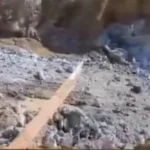Leading member of the Democracy Hub, Oliver Barker-Vormawor, has been granted bail by the High Court in Accra in the sum of GHC20,000.
In addition to the bail amount, he is required to produce two sureties and report to the police twice a week.
Barker-Vormawor was previously denied bail three times—once by the High Court and twice by the Circuit Court.
Justice Ayittey Armah-Tetteh had earlier refused his bail application but directed the Circuit Court to commence his trial within 72 hours, failing which bail could be considered.
Following that order and the fact that the 72 hours had elapsed, Barker-Vormawor’s lawyers, led by Dr. Justice Srem Sai, filed a repeat bail application at the High Court.
Although Esi Yankah, representing the Attorney General, opposed the request, the High Court granted him bail.
Barker-Vormawor and other protesters have pleaded not guilty to charges including unlawful assembly, stealing, and unlawful damage.
Background
According to the brief facts of the case presented to the Court, the accused persons are part of a group of protesters.
On July 9, 2024, the Police Service received a notice from a group known as the “Democracy Hub,” informing them of their intention to hold a protest dubbed “#Wetaya #ReoccupyJulorbihouse Demonstration.”
The Prosecution stated that the group requested the police to provide security and protection for the intended demonstration.
The group indicated that they intended to protest at the Revolutionary Square, opposite the Jubilee House.
After several meetings, the Police advised the group to propose an alternative venue, as the chosen location was considered a security zone and likely to affect public order, potentially leading to violence or endangering public defense.
By an order of the High Court dated September 18, 2024, the group was prohibited from holding the demonstration at Revolutionary Square.
The Police communicated this to the group’s convener and suggested seven alternative locations for the protest in the interest of public order.
However, the group rejected the proposed venues and opted to protest at the 37 Roundabout, a location rejected by the Police.
On September 21, 2024, the group proceeded with their protest and gathered around the 37 Roundabout, insisting on marching to the Revolutionary Square.
The Police mounted barricades around the 37 Roundabout to maintain security and order.
These barricades prevented the demonstrators from proceeding to Revolutionary Square.
Serious Traffic
The Prosecution stated that the demonstration suddenly turned chaotic as the accused persons began blocking major roads with stones and vehicles, causing significant delays and traffic around Liberation Road, the El-Wak Stadium, Kawukudi Road, and its environs. This caused inconvenience and frustration for commuters.
Billboards
The Prosecution further stated that the accused persons pulled down billboards and burned electoral posters and political party flags.
Additionally, the accused forcefully pushed down police barricades, obstructing the police’s efforts to maintain peace and security.
On September 22, 2024, the accused persons again blocked major roads with vehicles. The police quickly intervened to remove the vehicles and restore the flow of traffic.
However, the accused fiercely resisted the police’s attempts to tow the vehicles.
The Prosecution claimed that the first accused, in particular, forcefully entered a police towing van and, without authorization, turned off the engine and removed the ignition key, preventing the police from towing the vehicle used to block the roads. The first accused then fled with the key to the police van.
Source: Ghana/Starrfm.com.gh/Murtala Inusah




